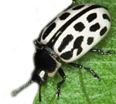Etymology of the scientific species names of the beetle fauna of Germany |
|
The etymology module allows to "translate" many scientific species names of the beetles from the German fauna. Often, their names are derived from Latin or ancient Greek words which describe the beetle and its properties. Those interested to learn what Harpalus rufipes actually means, have found the right place on kerbtier.de. The basis of this module is the publication "Erklärung der wissenschaftlichen Käfernamen aus Reitters Fauna Germanica" by Sigmund Schenkling, published in 1917 at K.G. Lutz in Stuttgart. I have added some editorial amendments and translated the entire work into English. |
|
| Term | Meaning |
|---|---|
| quadratus, a, um (quadrātus, a, um) | square |
| quadricollis, e (quadricóllis, e) | quádrus, square, and cóllum, neck, pronotum |
| quadricornis, e (quadricórnis, e) | quáttuor, in conjunction quádri-, four, and córnu, horn, antennae – mandibles antenna-like |
| quadricuspidatus, a, um (quadricuspidātus, a, um) | quáttuor, in conjunction quádri-, four, and cuspidātus, pointed |
| quadridens (quádridens) | quáttuor, in conjunction quádri-, four, and dens, tooth |
| quadridentatus, a, um (quadridentātus, a, um) | quáttuor, in conjunction quádri-, four, and dentātus, toothed |
| quadridentulus, a, um (quadridéntulus, a, um) | quáttuor, in conjunction quádri-, four, and déntulus, little tooth |
| quadrifasciatus, a, um (quadrifasciātus, a, um) | quáttuor, in conjunction quádri-, four, and fasciātus, banded (transverse) |
| quadrifidus, a, um (quadrífidus, a, um) | quáttuor, in conjunction quádri-, four, and fidus, split |
| quadrifoveolatus, a, um (quadrifoveolātus, a, um) | quáttuor, in conjunction quádri-, four, and foveolātus, with dimples |
| quadrigeminus, a, um (quadrigéminus, a, um) | quáttuor, in conjunction quádri-, four, and géminus, twin |
| quadriguttatus, a, um (quadriguttātus, a, um) | quáttuor, in conjunction quádri-, four, and guttātus, sprinkled |
| quadriimpressus, a, um (quadriimpréssus, a, um) | quáttuor, in conjunction quádri-, four, and impréssus, impressed |
| quadrilineatus, a, um (quadrilineātus, a, um) | quáttuor, in conjunction quádri-, four, and lineātus, lined |
| quadrillum (quadríllum) | square |
| quadrimaculatus, a, um (quadrimaculātus, a, um) | quattuor, in conjunction quádri-, four,, and maculātus, spotted |
| quadrinaevus, a, um (quadrināēvus, a, um) | quattuor, in conjunction quádri-, four, and nāēvus, mark |
| quadrinodosus, a, um (quadrinodōsus, a, um) | quattuor, in conjunction quádri-, four, and nodosus, nodose |
| quadrinotatus, a, um (quadrinotātus, a, um) | quattuor, in conjunction quádri-, four, and notātus, marked |
| quadriornatus, a, um (quadriornātus, a, um) | quattuor, in conjunction quádri-, four, and ornātus, decorated |
| quadripunctatus, a, um (quadripunctātus, a, um) | quattuor, in conjunction quádri-, four, and punctātus, dotted |
| quadripunctulus, a, um (quadripúnctulus, a, um) | quattuor, in conjunction quádri-, four, and púnctulus, small dot |
| quadripustulatus, a, um (quadripustulātus, a, um) | quattuor, in conjunction quádri-, four, and pustulātus, with pustules |
| quadriscopulatus, a, um (quadriscopulātus, a, um) | quattuor, in conjunction quádri-, four, and scōpula, small broom – middle tarsi with strong bristles |
| quadrisignatus, a, um (quadrisignātus, a, um) | quattuor, in conjunction quádri-, four, and signātus, marked |
| quadristigma (quadristígma) | quattuor, in conjunction quádri-, four, and gr. stígma, dot |
| quadristriatus, a, um (quadristriātus, a, um) | quattuor, in conjunction quádri-, four, and striātus, striped |
| quadrisulcatus, a, um (quadrisulcātus, a, um) | quattuor, in conjunction quádri-, four, and sulcātus, crenate |
| quadrisulcus (quadrisúlcus) | quattuor, in conjunction quádri-, four, and súlcus, groove |
| quadrituberculatus, a, um (quadrituberculātus, a, um) | quattuor, in conjunction quádri-, four, and tuberculātus, tuberculated |
| quadrum (quádrum) | square |
| subquadrifoveolatus, a, um (subquadrifoveolātus, a, um) | with four weak dimples |


